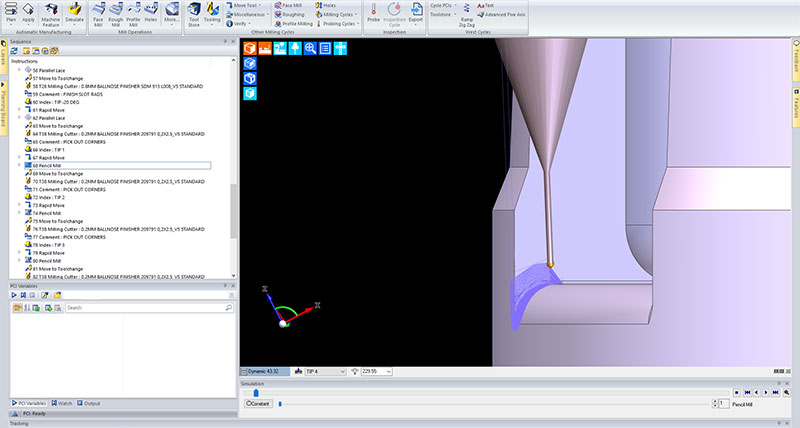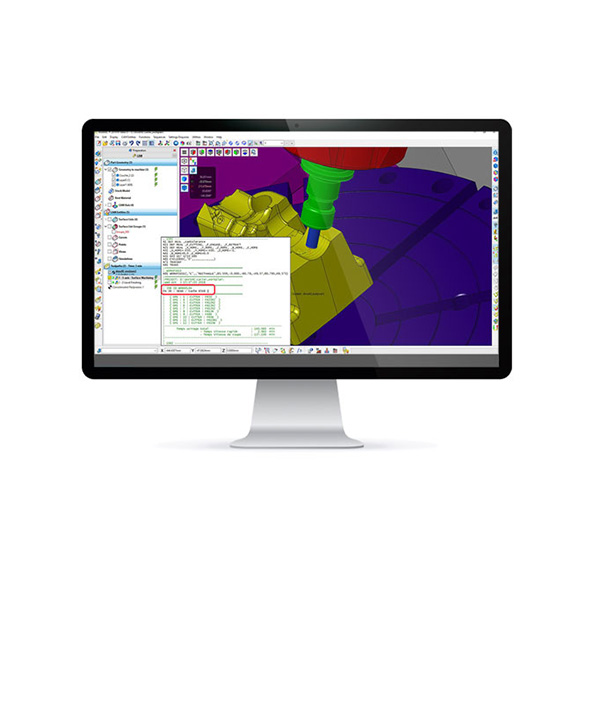EDGECAM behind West Pharmaceutical Services COVID-19 vaccine containers
“Clever Macro” replicates up to 200 features on single piece of graphite
Contact us

As the world moves ever closer to being able to distribute an effective vaccine against COVID-19, a leading supplier to the pharmaceutical industry is manufacturing packaging components and delivery systems ready to support the vaccine, once it’s readily available.
West Pharmaceutical Services has 25 manufacturing sites around the world, including a plant in Cornwall where they manufacture tools for elastomeric packaging components.
Their mould tools are produced on a range of 24 Makino V80S 5-axis vertical mills, Haas VF, VM and mini mills, and Ingersoll V5 CNC machines programmed with the market-leading EDGECAM software. Interim Production Manager Chris Tamblyn says all programming, from simple, basic operations, through to complex, fully automated 5-axis machining, goes through EDGECAM.
Designed at another of their European plants, the CAD files for the mould tools are imported into EDGECAM at the Bodmin workshop. “Until recently we used wireframe 2D CAD files, and there’s still some legacy work from those for old, low-demand tools which need to be refurbished. But all our new work is based on 3D solid models.”
West’s mouId tools produce literally hundreds of millions of plastic and rubber products throughout their life cycle. And current demand is solid – from both existing customers as well as new opportunities from companies looking to develop COVID-19 solutions. “There’s been a recent upsurge in products required for the fight against COVID-19, including vials, stoppers, plugs and plungers.”
Customised routines play an important role in the traditional manufacture of their steel tools. “We import the CAD data into EDGECAM and work on all six faces with multiple set-ups. But because our tooling is often very similar to something we’ve produced before, we have a number of repetitive operations, cycles and requirements. Over the years we’ve created a lot of routine files, so now, whenever we can, we use pre-constructed files that we’ve customised ourselves to populate our sequences,” says Chris Tamblyn.
“Once we’ve created a new routine it’s stored in EDGECAM, and can populate a sequence extremely quickly, to work on multiple features, from the guides to the cavitations. It’s then outputted through EDGECAM, and once the toolpath simulator has approved it, the program is released to the machine network.”
A different process is adopted for graphite tooling, using only solid model CAD data for full 5-axis machining. “Each electrode is uniquely designed for each tool, so one of our skilled CAM engineers considers what’s required for diamond coated tooling, material removal, and the delicate nature of graphite, to produce some very complex forms.
“Our electrodes are high cavitation – so we don’t just make one feature on one electrode; we use one piece of graphite which can hold up to 200 small, unique features.” He says this has been made possible by EDGECAM engineers customising their post processor. “We can create files very quickly and respond to changes. Previously, the standard manufacturing method was slow to generate sequences and NC code. But now we create a sequence, manufacturing one single impression electrode. Then, using a clever macro created by the EDGECAM team in the post file, we activate a repetition command that carries out a sub routine function. This part is then replicated on to larger piece of graphite, however many times as required for the mould tool.”
But that’s not the end of EDGECAM’s involvement. The software’s specialist inspection module then comes into play, using the same CAD data as was interrogated for cutting. EDGECAM Inspect combines Hexagon’s industry-leading metrology tools with cutting edge manufacturing expertise to provide Chris Tamblyn with a full-featured, easy to use inspection system. The module creates on-machine measurement cycles for both in-process and end-item part inspections, using an intuitive set of tools for measuring geometric features such as surface points, bores, bosses, pockets, webs, widths and heights. It also evaluates the relationship between features such as roundness, flatness and straightness.
“We were the first company to use the Inspect module when it launched, and we worked closely with EDGECAM on its development. Now, we can inspect what we manufacture in a single cell, saving us considerable time and stopping possible contamination in our QA lab.”
Once the mould tools receive final approval, they’re shipped to West’s manufacturing plants in Europe, to begin their lifecycle of producing millions of pharmaceutical packaging components and delivery systems.
West Pharmaceutical Services has 25 manufacturing sites around the world, including a plant in Cornwall where they manufacture tools for elastomeric packaging components.
Their mould tools are produced on a range of 24 Makino V80S 5-axis vertical mills, Haas VF, VM and mini mills, and Ingersoll V5 CNC machines programmed with the market-leading EDGECAM software. Interim Production Manager Chris Tamblyn says all programming, from simple, basic operations, through to complex, fully automated 5-axis machining, goes through EDGECAM.
Designed at another of their European plants, the CAD files for the mould tools are imported into EDGECAM at the Bodmin workshop. “Until recently we used wireframe 2D CAD files, and there’s still some legacy work from those for old, low-demand tools which need to be refurbished. But all our new work is based on 3D solid models.”
West’s mouId tools produce literally hundreds of millions of plastic and rubber products throughout their life cycle. And current demand is solid – from both existing customers as well as new opportunities from companies looking to develop COVID-19 solutions. “There’s been a recent upsurge in products required for the fight against COVID-19, including vials, stoppers, plugs and plungers.”
Customised routines play an important role in the traditional manufacture of their steel tools. “We import the CAD data into EDGECAM and work on all six faces with multiple set-ups. But because our tooling is often very similar to something we’ve produced before, we have a number of repetitive operations, cycles and requirements. Over the years we’ve created a lot of routine files, so now, whenever we can, we use pre-constructed files that we’ve customised ourselves to populate our sequences,” says Chris Tamblyn.
“Once we’ve created a new routine it’s stored in EDGECAM, and can populate a sequence extremely quickly, to work on multiple features, from the guides to the cavitations. It’s then outputted through EDGECAM, and once the toolpath simulator has approved it, the program is released to the machine network.”
A different process is adopted for graphite tooling, using only solid model CAD data for full 5-axis machining. “Each electrode is uniquely designed for each tool, so one of our skilled CAM engineers considers what’s required for diamond coated tooling, material removal, and the delicate nature of graphite, to produce some very complex forms.
“Our electrodes are high cavitation – so we don’t just make one feature on one electrode; we use one piece of graphite which can hold up to 200 small, unique features.” He says this has been made possible by EDGECAM engineers customising their post processor. “We can create files very quickly and respond to changes. Previously, the standard manufacturing method was slow to generate sequences and NC code. But now we create a sequence, manufacturing one single impression electrode. Then, using a clever macro created by the EDGECAM team in the post file, we activate a repetition command that carries out a sub routine function. This part is then replicated on to larger piece of graphite, however many times as required for the mould tool.”
But that’s not the end of EDGECAM’s involvement. The software’s specialist inspection module then comes into play, using the same CAD data as was interrogated for cutting. EDGECAM Inspect combines Hexagon’s industry-leading metrology tools with cutting edge manufacturing expertise to provide Chris Tamblyn with a full-featured, easy to use inspection system. The module creates on-machine measurement cycles for both in-process and end-item part inspections, using an intuitive set of tools for measuring geometric features such as surface points, bores, bosses, pockets, webs, widths and heights. It also evaluates the relationship between features such as roundness, flatness and straightness.
“We were the first company to use the Inspect module when it launched, and we worked closely with EDGECAM on its development. Now, we can inspect what we manufacture in a single cell, saving us considerable time and stopping possible contamination in our QA lab.”
Once the mould tools receive final approval, they’re shipped to West’s manufacturing plants in Europe, to begin their lifecycle of producing millions of pharmaceutical packaging components and delivery systems.
